RLHF For High-Performance Decision-Making: Strategies and Optimization
Analytics Vidhya
SEPTEMBER 11, 2023
It will be engineered to optimize decision-making and enhance performance in real-world complex systems.
This site uses cookies to improve your experience. To help us insure we adhere to various privacy regulations, please select your country/region of residence. If you do not select a country, we will assume you are from the United States. Select your Cookie Settings or view our Privacy Policy and Terms of Use.
Cookies and similar technologies are used on this website for proper function of the website, for tracking performance analytics and for marketing purposes. We and some of our third-party providers may use cookie data for various purposes. Please review the cookie settings below and choose your preference.
Used for the proper function of the website
Used for monitoring website traffic and interactions
Cookies and similar technologies are used on this website for proper function of the website, for tracking performance analytics and for marketing purposes. We and some of our third-party providers may use cookie data for various purposes. Please review the cookie settings below and choose your preference.

Analytics Vidhya
SEPTEMBER 11, 2023
It will be engineered to optimize decision-making and enhance performance in real-world complex systems.

Analytics Vidhya
JANUARY 8, 2024
Introduction ChatGPT In the dynamic landscape of modern business, the intersection of machine learning and operations (MLOps) has emerged as a powerful force, reshaping traditional approaches to sales conversion optimization.
This site is protected by reCAPTCHA and the Google Privacy Policy and Terms of Service apply.

Analytics Vidhya
JANUARY 3, 2024
Introduction Python is a versatile and powerful programming language widely used for various applications, from web development to data analysis and machine learning. However, one common concern among Python developers is the performance of their code.

O'Reilly on Data
JULY 15, 2019
A look at how guidelines from regulated industries can help shape your ML strategy. As companies use machine learning (ML) and AI technologies across a broader suite of products and services, it’s clear that new tools, best practices, and new organizational structures will be needed. Sources of model risk. Model monitoring.

Smart Data Collective
SEPTEMBER 13, 2023
AI technology is especially beneficial with digital marketing, since digital marketers can take advantage of large amounts of data to optimize their strategies. Machine Learning is Crucial for Success in Digital Marketing If you have a Spotify or Netflix account, you have probably noticed a trend.

CIO Business Intelligence
DECEMBER 3, 2024
But it’s important to understand that AI is an extremely broad field and to expect non-experts to be able to assist in machine learning, computer vision, and ethical considerations simultaneously is just ridiculous.” “A certain level of understanding when it comes to AI is required, especially amongst the executive teams,” he says.

CIO Business Intelligence
NOVEMBER 27, 2024
Recent research shows that 67% of enterprises are using generative AI to create new content and data based on learned patterns; 50% are using predictive AI, which employs machine learning (ML) algorithms to forecast future events; and 45% are using deep learning, a subset of ML that powers both generative and predictive models.

Smart Data Collective
FEBRUARY 16, 2023
We have talked extensively about some of the changes machine learning has introduced to the marketing profession. According to one analysis, companies that used machine learning in their marketing strategies boosted sales by up to 50%. How Can Machine Learning Boost Your Social Media Marketing ROI?

David Menninger's Analyst Perspectives
MAY 15, 2025
Oracle recently hosted its annual Database Analyst Summit, sharing the vision and strategy for its data platform. In addition to various deployment options, Oracle offers several database services, including Oracle Exadata optimized infrastructure, Oracle Autonomous Database, Oracle Autonomous Data Warehouse and Heatwave MySQL service.

Smart Data Collective
APRIL 13, 2022
Machine learning technology is becoming a more important aspect of modern marketing. One of the biggest reasons for this is that digital marketing is playing a huge role in marketing strategies for most companies. Machine learning technology is a very important element of digital marketing.
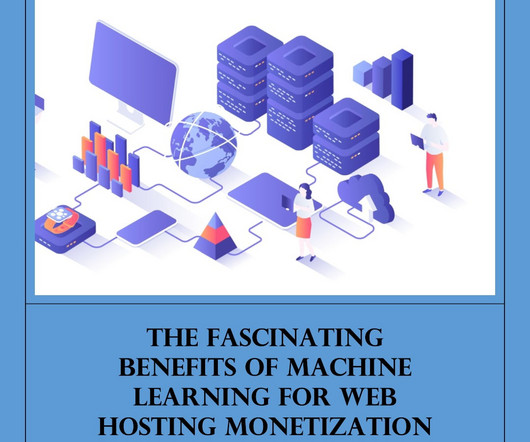
Smart Data Collective
NOVEMBER 7, 2023
If you’re eager to monetize the web hosting services you offer to third party site owners, or you have a selection of self-hosted sites which you are eager to wring more cash out of, then machine learning could be the answer. This is where machine learning from top developers comes into play.

O'Reilly on Data
MARCH 31, 2020
If you’re already a software product manager (PM), you have a head start on becoming a PM for artificial intelligence (AI) or machine learning (ML). AI products are automated systems that collect and learn from data to make user-facing decisions. We won’t go into the mathematics or engineering of modern machine learning here.

CIO Business Intelligence
JUNE 2, 2022
Recent notable research from the University of Cambridge, enabled by energy efficient HPC, includes a study on transformational machine learning (TML) and another on a robotic approach to reproducing research results. . Teaching Machines to ‘Learn How to Learn’. Just starting out with analytics?
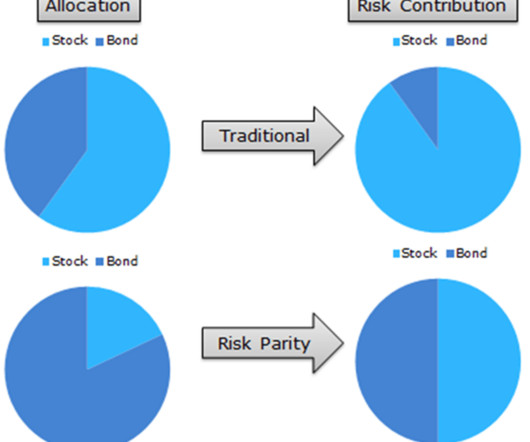
Smart Data Collective
FEBRUARY 28, 2023
Machine learning technology has already had a huge impact on our lives in many ways. There are numerous ways that machine learning technology is changing the financial industry. However, machine learning can also help financial professionals as well. What is risk parity?

AWS Big Data
JANUARY 9, 2025
In our previous post Backtesting index rebalancing arbitrage with Amazon EMR and Apache Iceberg , we showed how to use Apache Iceberg in the context of strategy backtesting. This capability is particularly valuable in maintaining the integrity of backtests and the reliability of trading strategies.

CIO Business Intelligence
DECEMBER 30, 2024
AI and machine learning are poised to drive innovation across multiple sectors, particularly government, healthcare, and finance. Data sovereignty and the development of local cloud infrastructure will remain top priorities in the region, driven by national strategies aimed at ensuring data security and compliance.

CIO Business Intelligence
NOVEMBER 4, 2024
research firm Vanson Bourne to survey 650 global IT, DevOps, and Platform Engineering decision-makers on their enterprise AI strategy. AI a primary driver in IT modernization and data mobility AI’s demand for data requires businesses to have a secure and accessible data strategy. Nutanix commissioned U.K.

Smart Data Collective
FEBRUARY 23, 2023
By analyzing data and extracting useful insights, brands can make informed decisions to optimize their branding strategies. This article will explore data mining and how it can help online brands with brand optimization. Conclusion Data mining is a powerful tool for online brands looking to optimize their branding strategies.

CIO Business Intelligence
OCTOBER 30, 2024
As businesses increasingly rely on digital platforms to interact with customers, the need for advanced tools to understand and optimize these experiences has never been greater. While Felix AI already enables businesses to process data at scale and act on insights faster, the potential for further automation and optimization is vast.
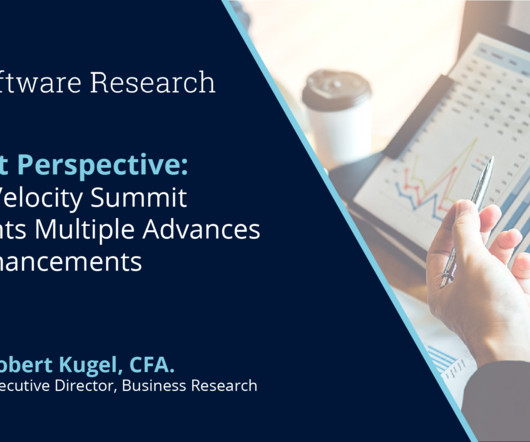
David Menninger's Analyst Perspectives
NOVEMBER 12, 2024
Also center stage were Infor’s advances in artificial intelligence and process mining as well as its environmental, social and governance application and supply chain optimization enhancements. Optimize workflows by redesigning processes based on data-driven insights. Establish and support continuous improvement initiatives.
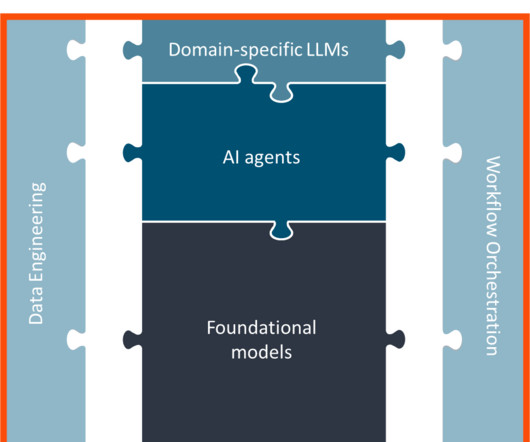
CIO Business Intelligence
DECEMBER 10, 2024
To integrate AI into enterprise workflows, we must first do the foundation work to get our clients data estate optimized, structured, and migrated to the cloud. Once the data foundation is in place, it is important to then select and embed the best combination of AI models into the workflow to optimize for cost, latency, and accuracy.
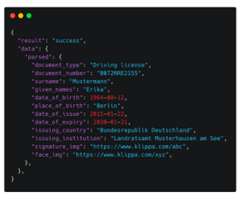
Smart Data Collective
SEPTEMBER 29, 2022
One study by Think With Google shows that marketing leaders are 130% as likely to have a documented data strategy. Data strategies are becoming more dependent on new technology that is arising. You get the structured information in a machine-readable format, such as JSON. The software learns from the documents submitted to it.
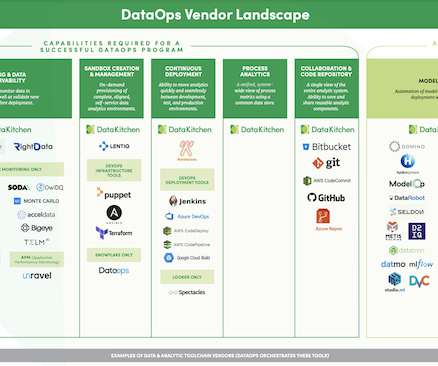
DataKitchen
APRIL 13, 2021
We have also included vendors for the specific use cases of ModelOps, MLOps, DataGovOps and DataSecOps which apply DataOps principles to machine learning, AI, data governance, and data security operations. . Dagster / ElementL — A data orchestrator for machine learning, analytics, and ETL. . Collaboration and Sharing.
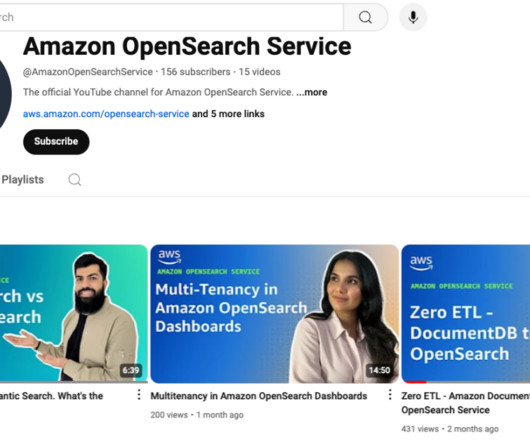
AWS Big Data
OCTOBER 17, 2024
Whether you’re just getting started with searches , vectors, analytics, or you’re looking to optimize large-scale implementations, our channel can be your go-to resource to help you unlock the full potential of OpenSearch Service.

O'Reilly on Data
MAY 14, 2020
This role includes everything a traditional PM does, but also requires an operational understanding of machine learning software development, along with a realistic view of its capabilities and limitations. In our previous article, What You Need to Know About Product Management for AI , we discussed the need for an AI Product Manager.

Smart Data Collective
FEBRUARY 9, 2022
Learn how DirectX visualization can improve your study and assessment of different trading instruments for maximum productivity and profitability. A growing number of traders are using increasingly sophisticated data mining and machine learning tools to develop a competitive edge.

CIO Business Intelligence
OCTOBER 24, 2024
By 2026, hyperscalers will have spent more on AI-optimized servers than they will have spent on any other server until then, Lovelock predicts. Forrester also recently predicted that 2025 would see a shift in AI strategies , away from experimentation and toward near-term bottom-line gains. Next year, that spending is not going away.

O'Reilly on Data
SEPTEMBER 15, 2020
Likewise, AI doesn’t inherently optimize supply chains, detect diseases, drive cars, augment human intelligence, or tailor promotions to different market segments. Therefore, AI techniques don’t just solve real-world problems out of the box. They don’t automatically generate revenue and growth, maximize ROI, or keep users engaged and loyal.

CIO Business Intelligence
NOVEMBER 22, 2022
Every enterprise needs a data strategy that clearly defines the technologies, processes, people, and rules needed to safely and securely manage its information assets and practices. Here’s a quick rundown of seven major trends that will likely reshape your organization’s current data strategy in the days and months ahead.

CIO Business Intelligence
NOVEMBER 1, 2024
Paul Beswick, CIO of Marsh McLennan, served as a general strategy consultant for most of his 23 years at the firm but was tapped in 2019 to relaunch the risk, insurance, and consulting services powerhouse’s global digital practice. It’s a full-fledged platform … pre-engineered with the governance we needed, and cost-optimized.

CIO Business Intelligence
DECEMBER 17, 2024
As CIO of Avnet one of the largest technology distributors and supply chain solution providers Im responsible for the organizations IT stack and oversee digital transformation and strategy. But after putting some discipline around it and pinpointing where we can optimize our operations, we have found a better balance.

Analytics Vidhya
JUNE 1, 2023
This article explores how data analytics optimizes strategies by leveraging player performances and opposition weaknesses. Introduction Cricket embraces data analytics for strategic advantage. With franchise leagues like IPL and BBL, teams rely on statistical models and tools for competitive edge.
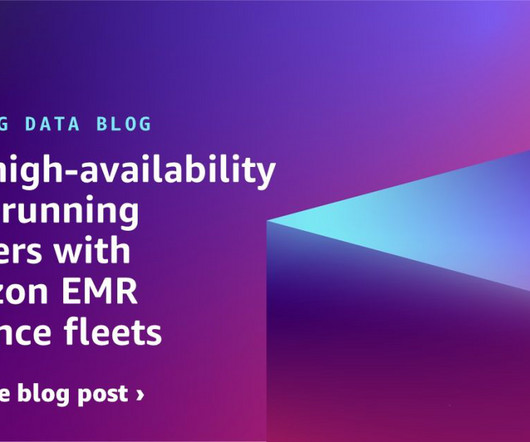
AWS Big Data
NOVEMBER 21, 2024
Amazon EMR is a cloud big data platform for petabyte-scale data processing, interactive analysis, streaming, and machine learning (ML) using open source frameworks such as Apache Spark , Presto and Trino , and Apache Flink. Under Allocation strategy , select Apply allocation strategy.

CIO Business Intelligence
DECEMBER 20, 2024
Optimize data flows for agility. Limit the times data must be moved to reduce cost, increase data freshness, and optimize enterprise agility. AI and machine learning models. They should also be optimized to share data across systems, geographies, and organizations. Application programming interfaces.

Rocket-Powered Data Science
JUNE 17, 2022
Observability is a business strategy: what you monitor, why you monitor it, what you intend to learn from it, how it will be used, and how it will contribute to business objectives and mission success. Do not confuse observability with monitoring (specifically, with IT monitoring). Reference ) Splunk Enterprise 9.0 is here, now!

CIO Business Intelligence
OCTOBER 22, 2024
Cloud strategies are undergoing a sea change of late, with CIOs becoming more intentional about making the most of multiple clouds. A lot of ‘multicloud’ strategies were not actually multicloud. Today’s strategies are increasingly multicloud by intention,” she adds.

CIO Business Intelligence
JANUARY 6, 2025
Wetmur says Morgan Stanley has been using modern data science, AI, and machine learning for years to analyze data and activity, pinpoint risks, and initiate mitigation, noting that teams at the firm have earned patents in this space. Its more about optimizing and maximizing the value were getting out of gen AI, she says.
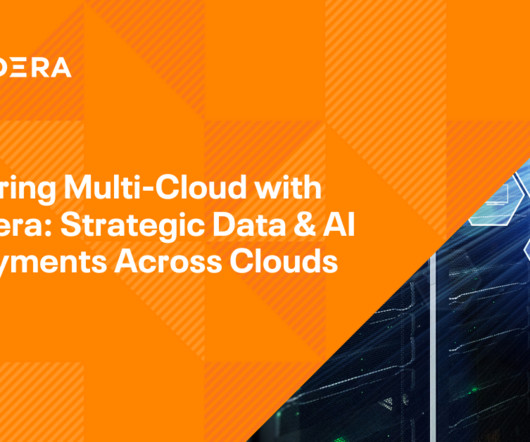
Cloudera
JANUARY 7, 2025
In todays dynamic digital landscape, multi-cloud strategies have become vital for organizations aiming to leverage the best of both cloud and on-premises environments. Adopting hybrid and multi-cloud models provides enterprises with flexibility, cost optimization, and a way to avoid vendor lock-in. Why Hybrid and Multi-Cloud?

IBM Big Data Hub
MAY 20, 2024
Machine learning (ML) has become a critical component of many organizations’ digital transformation strategy. From predicting customer behavior to optimizing business processes, ML algorithms are increasingly being used to make decisions that impact business outcomes.

CIO Business Intelligence
FEBRUARY 6, 2025
As someone deeply involved in shaping data strategy, governance and analytics for organizations, Im constantly working on everything from defining data vision to building high-performing data teams. In retail, they can personalize recommendations and optimize marketing campaigns. These potential applications are truly transformative.
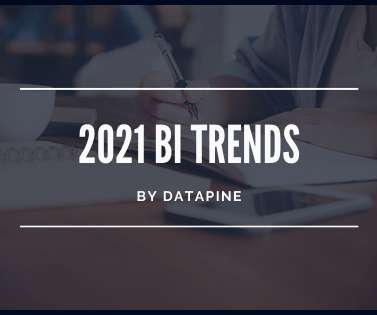
datapine
NOVEMBER 27, 2019
In 2020, BI tools and strategies will become increasingly customized. Accordingly, the rise of master data management is becoming a key priority in the business intelligence strategy of a company. The trends we presented last year will continue to play out through 2020. Source: Business Application Research Center *.

CIO Business Intelligence
NOVEMBER 1, 2024
Paul Beswick, CIO of Marsh McLellan, served as a general strategy consultant for most of his 23 years at the firm but was tapped in 2019 to relaunch the risk, insurance, and consulting services powerhouse’s global digital practice. It’s a full-fledged platform … pre-engineered with the governance we needed, and cost-optimized.

CIO Business Intelligence
DECEMBER 5, 2024
Incorporating custom knowledge graphs, enriched with domain expertise, further optimizes data consolidation. This shift allows for enhanced context learning, prompt augmentation, and self-service data insights through conversational business intelligence tools, as well as detailed analysis via charts.

O'Reilly on Data
SEPTEMBER 19, 2023
They’d grown tired of learning what is; now they wanted to know what’s next. Stage 2: Machine learning models Hadoop could kind of do ML, thanks to third-party tools. It felt like, almost overnight, all of machine learning took on some kind of neural backend. Those algorithms packaged with scikit-learn?
Expert insights. Personalized for you.
We have resent the email to
Are you sure you want to cancel your subscriptions?


Let's personalize your content